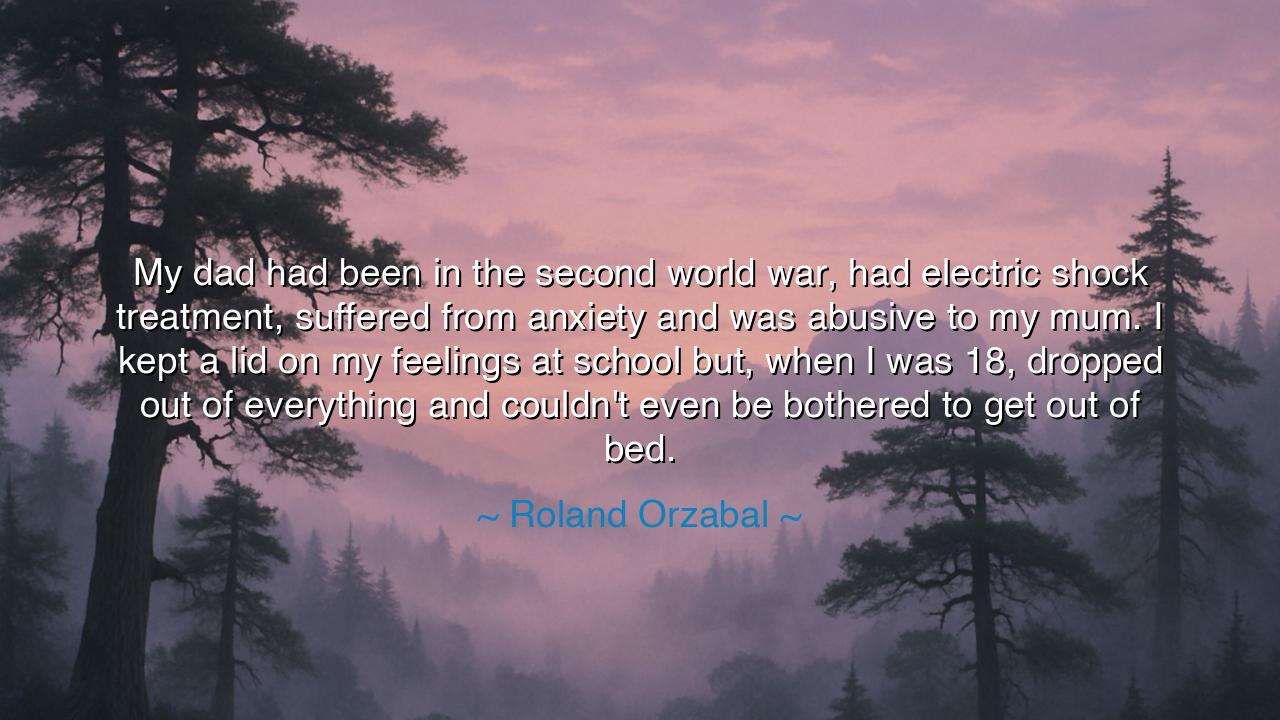
My dad had been in the second world war, had electric shock
My dad had been in the second world war, had electric shock treatment, suffered from anxiety and was abusive to my mum. I kept a lid on my feelings at school but, when I was 18, dropped out of everything and couldn't even be bothered to get out of bed.






Hearken, children of the ages yet to come, and heed the solemn words of Roland Orzabal, who recounted: “My dad had been in the second world war, had electric shock treatment, suffered from anxiety and was abusive to my mum. I kept a lid on my feelings at school but, when I was 18, dropped out of everything and couldn't even be bothered to get out of bed.” In these words lies a meditation on trauma, inheritance, and the burden of unspoken sorrow, revealing that the trials of one generation echo into the next, shaping hearts and minds in ways often unseen.
Orzabal’s reflection illuminates the ancient truth that the wounds of the past, if unaddressed, manifest in the lives of the living. The ancients believed that the soul bears memory not only of joy but of pain, and that unresolved suffering can fester silently until it demands recognition. In keeping his emotions hidden, Orzabal mirrored the experience of many, for the world often teaches restraint and stoicism while the heart yearns to speak.
Consider the story of Sigmund Freud himself, whose father endured hardships and whose family life bore traces of emotional turmoil. Freud’s early years were shaped by observation, repression, and reflection, which later informed his understanding of human psychology. Like Orzabal, those who inherit the shadows of trauma may struggle in youth, carrying burdens they scarcely comprehend, until the weight of suppressed emotion compels them to pause, reflect, or even retreat from life’s obligations.
The descent Orzabal describes—dropping out, failing to rise from bed—illustrates the power of despair born from accumulated suffering. The ancients recognized such moments as liminal: thresholds where the soul may either succumb or be reborn. In Greek myth, heroes often faced periods of desolation or isolation before emerging with renewed strength; their trials were necessary crucibles, forging resilience, self-knowledge, and eventual mastery of circumstance.
Orzabal’s experience also reveals the intergenerational nature of pain. His father, shaped by war, medical treatment, and personal anxieties, could not shelter his child from its echoes. The cycle of trauma is ancient: from the households of kings and generals to the families of peasants, hardship has passed like an unseen inheritance. Awareness and acknowledgment are the first steps toward breaking the chain, allowing healing and growth to flourish where silence once prevailed.
From this reflection emerges a timeless lesson: emotional suppression may sustain the façade of normalcy, but it does not free the soul. To live fully, one must confront the pain inherited or endured, seek understanding, and allow oneself the courage to grieve, express, and eventually transform suffering into resilience. Orzabal’s honesty exemplifies the bravery required to face one’s inner storms, a virtue extolled by the sages of old.
Practical guidance flows naturally: recognize the presence of inherited or personal trauma, seek support from those trained to guide the wounded heart, and honor the emotions that arise without judgment. Engage in creative, reflective, or communal practices that allow expression of what is held within. Through conscious confrontation and cultivation, the shadows of the past may become sources of strength, empathy, and insight rather than chains that bind.
Children of the ages, let Roland Orzabal’s reflection echo in your hearts: life’s burdens are neither shameful nor insurmountable. The trials of the past may press heavily, yet awareness, courage, and compassion for oneself can transform despair into mastery. By acknowledging suffering, seeking understanding, and nurturing resilience, the soul is prepared to rise from the depths, and the darkness inherited becomes the foundation upon which light and purpose may be built.
If you wish, I can also craft a more narrative, immersive version, depicting Orzabal’s youthful struggle and the path to recognition and resilience, making it feel like a spoken teaching from the ancients. Do you want me to do that?






AAdministratorAdministrator
Welcome, honored guests. Please leave a comment, we will respond soon